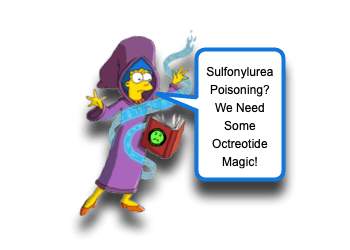Octreotide for Sulfonylureas Toxicity

We all should fear Hypoglycemia! It likes to deceive us; it can cause critical illness; and it can be caused by critical illness. Obviously, many conditions can be associated with hypoglycemia (ex, Burns, Seizures, Gastroenteritis, Inborn Errors). While the detection of hypoglycemia can be humbling (as we are prone to overlook it at first), the treatment should make us feel empowered (Problem found. Problem solved!); however, the treatment may be more intricate than just having the patient drink juice or giving IV dextrose. This is particularly true when a Sulfonylurea has been ingested. Let’s take a look at a specific therapy to keep in mind – Octreotide for Sulfonylurea Poisoning:
Sulfonylurea Poisoning: Basics
- Sulfonylureas are widely used for treating Type-2 Diabetes (so many of your pediatric patient’s family members use them!). [Glatstein, 2012; Lung, 2011]
- Sulfonylurea work by stimulating and DEpolarizing the Pancreatic Beta-Cells… leading to increased insulin secretion. [Dougherty, 2013; Glatstein, 2012]
- They stimulate insulin secretion regardless of plasma glucose level!
- They are rapidly absorbed after oral intake and work a long time! [Glatstein, 2012]
- Peak plasma levels reached within 2-4 hours.
- Duration of action is 12-24 hours.
- Duration of action can be even longer in overdose scenarios. [Pelavin, 2009]
- Sulfonylureas can cause significant and prolonged hypoglycemia! [Glatstein, 2012; Lung, 2011]
- One pill can cause hypoglycemia in infants and toddlers![Quadrani, 2008]
- Hypoglycemia can be delayed (by as much as 18 hours after ingestion of Rx) in individuals with access to food / dextrose. [Lung, 2011]
- Hypoglycemia can last up to 72 hours in overdose.
- 24 hour / overnight observation is usually warranted. [Lung, 2011; Levine, 2011; Quadrani, 2008]
Octreotide: The Rationale
- Octreotide is a synthetic analog of somatostatin. [Glatstein, 2012]
- Octreotide HYPERpolaizes the pancreatic Beta-cell, leading to marked decrease in insulin secretion. [Dougherty, 2013; Glatstein, 2012]
- Just giving more IV dextrose for refractory or recurrent hypoglycemia may exacerbate the problem.
- Dextrose is a potent stimulus for insulin secretion! [Dougherty, 2013]
- Glucagon can also stimulate endogenous insulin secretion. [Pelavin, 2009]
- Octreotide will reduce this affect and allow the dextrose to appropriately improve the condition.
- Octreotide also inhibits the secretion of several hormones: [Glatstein, 2012]
- Glucagon
- Growth Hormone
- Gastrin
- Octreotide also decreases GI motility and splanchnic blood flow. [Glatstein, 2012]
- Octreotide is indicated for treatment of: [Glatstein, 2012]
- Acromegaly
- Bleeding Esophageal Varices
- Vasoactive Intestinal Peptide – secreting tumor (VIPoma)
- Metastatic Carcinoid Tumors
- Zollinger-Ellison Syndrome
- Pituitary Adenomas
- Secretory Diarrhea
- Congenital Hyperinsulinism
- Insulinoma
- Octreotide can be given IV or SubCutaneously (SC) with peak effect within 15-30 min. [Pelavin, 2009]
Octreotide for Sulfonylurea Poisoning
- Octreotide is an “ideal antidote for Sulfonylurea Poisoning” and should be considered as first line therapy for the resulting in hypoglycemia! [Dougherty, 2013; Glatstein, 2012]
- Octreotide reduces the number of hypoglycemic episodes during therapy. [Dougherty, 2013; Dougherty, 2013]
- Most children only require one dose of octreotide, but because the half life is shorter than the sulfonylurea’s half life, 2-3 repeat doses may be required. [Dougherty, 2013]
- In children: [Glatstein, 2012]
- Octreotide 1 – 1.5 micrograms/kg IV or SC
- Continue IV dextrose therapy (ex, rule of 50).
- Repeat dose Octreotide 2-3 more times every 6 hours if needed.
- In adults (or adult-like children): [Glatstein, 2012]
- Octreotide 50 micrograms IV or SC
- Continue IV dextrose therapy (ex, rule of 50).
- Repeat dose Octreotide every 6 hours for 3 more doses if needed.
Moral of the Morsel
- Always be vigilant for hypoglycemia! It is lurking out there and easy to find if you look… just need one drop of blood.
- Think beyond the glucose! Ask yourself why is the patient hypoglycemic… and then ask whether it could be do to a Sulfonlyurea.
- Octreotide to the Rescue! If you know the hypoglycemia is due to Sulfonylurea or you have concern for it given refractory hypoglycemia episodes… reach for the Octreotide in addition to giving more sugar!
References
Dougherty PP1, Lee SC, Lung D, Klein-Schwartz W. Evaluation of the use and safety of octreotide as antidotal therapy for sulfonylurea overdose in children. Pediatr Emerg Care. 2013 Mar;29(3):292-5. PMID: 23426239. [PubMed] [Read by QxMD]
Glatstein M1, Scolnik D, Bentur Y. Octreotide for the treatment of sulfonylurea poisoning. Clin Toxicol (Phila). 2012 Nov;50(9):795-804. PMID: 23046209. [PubMed] [Read by QxMD]
Levine M1, Ruha AM, Lovecchio F, Riley BD, Pizon AF, Burns BD, Thomas SH. Hypoglycemia after accidental pediatric sulfonylurea ingestions. Pediatr Emerg Care. 2011 Sep;27(9):846-9. PMID: 21878825. [PubMed] [Read by QxMD]
Lung DD1, Olson KR. Hypoglycemia in pediatric sulfonylurea poisoning: an 8-year poison center retrospective study. Pediatrics. 2011 Jun;127(6):e1558-64. PMID: 21606145. [PubMed] [Read by QxMD]
Glatstein M1, Garcia-Bournissen F, Scolnik D, Koren G. Sulfonylurea intoxication at a tertiary care paediatric hospital. Can J Clin Pharmacol. 2010 Winter;17(1):e51-6. PMID: 20124602. [PubMed] [Read by QxMD]
Pelavin PI1, Abramson E, Pon S, Vogiatzi MG. Extended-release glipizide overdose presenting with delayed hypoglycemia and treated with subcutaneous octreotide. J Pediatr Endocrinol Metab. 2009 Feb;22(2):171-5. PMID: 19449674. [PubMed] [Read by QxMD]
Michael JB1, Sztajnkrycer MD. Deadly pediatric poisons: nine common agents that kill at low doses. Emerg Med Clin North Am. 2004 Nov;22(4):1019-50. PMID: 15474780. [PubMed] [Read by QxMD]
Spiller HA1. Management of sulfonylurea ingestions. Pediatr Emerg Care. 1999 Jun;15(3):227-30. PMID: 10389964. [PubMed] [Read by QxMD]
Quadrani DA1, Spiller HA, Widder P. Five year retrospective evaluation of sulfonylurea ingestion in children. J Toxicol Clin Toxicol. 1996;34(3):267-70. PMID: 8667462. [PubMed] [Read by QxMD]


Don’t give 50mcg/kg octreotide to adults/adult-like children…just 25-50mcg total per dose will do! The 1mcg/kg for smaller children is correctly calculated by weight.
Adrian, THANK YOU for your sharp eyes!
I’ve corrected the typo.
Muchas Gracias!
-sean